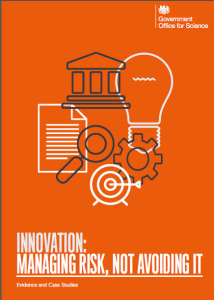
Professor Andy Stirling writes chapter in the UK Government Chief Scientific Adviser’s inaugural report
Sir Mark Walport today launches his first ever annual report as UK Government Chief Scientific Adviser, Innovation: Managing risk not avoiding it, which includes a chapter written by Professor Andy Stirling, Co-Director of the ESRC-funded STEPS Centre, based at the Science Policy Research Unit (SPRU) of the University of Sussex.
In his contributory chapter, Making choices in the face of uncertainty: towards innovation democracy? Professor Stirling criticises the tendency in conventional debates on new technologies, to treat supporters as being simply ‘pro innovation’ and critics generally ‘anti-science’. Such language can be routinely heard being used, for instance, in controversies over GM foods, new chemicals or nuclear power.
According to Prof. Stirling: “The problem is that this misses the single most important point about innovation. Like other areas of policy – the key issues are about choosing between alternatives. To reduce this to simply being ‘for’ or ‘against’ the particular choice favoured by the most powerful interests is both irrational and anti-democratic”.
Referring to torture, weapons of mass destruction and financial fraud, Prof. Stirling points out that not all innovation is necessarily positive. Any particular innovation is typically ambiguous – open to being viewed in different ways. He therefore argues: “Whether any given innovation is preferable to the alternatives is not just a technical issue, but a fundamentally political question. To pretend that this is simply about ‘science based’ evidence – with no room for different social values – is also undermining of democracy”.
Prof. Stirling’s chapter explores the case for more mature debate and more reasoned decision-making. Across a range of areas, if we are to secure a future for all, there is a need to treat alternative priorities, resource allocations and innovation options in much more balanced and transparent ways, he believes.
For Prof. Stirling, the issues are not just about how fast to go, or even what the risks or benefits might be, in pursuing some supposedly single option, like GM foods. The real questions are about how privileged innovations can quickly get ‘locked in’ and alternatives ‘crowded out’. In the case of sustainable global food production, the chapter details a wide range of alternatives that even UK government support suggests often to be preferable to GM in their potential.
Also today, Prof. Stirling and Professor Paul Nightingale, also of SPRU, gave evidence at the fourth session of the House of Commons Science and Technology Select Committee’s inquiry into genetically modified (GM) foods and the way in which these are regulated at European level under the precautionary principle. See resource pack GM food and the precautionary principle.
In both his chapter and his evidence to the committee, Prof. Stirling highlights the importance of more democratic institutions, practices and debates around innovation. Rather than reducing everything simply to ‘risk’, much more attention needs to be given to unquantifiable uncertainties – highlighting the value of more responsible, participatory and precautionary methods for assessing alternative choices.
He also argues for much greater attention to diversity – both in the portfolios of options that can be supported and in the plurality of perspectives to take into account. There exist a range of different practical methods for more effectively addressing these issues, but these also tend to be neglected in simplistic polarizing ‘pro’ / ‘anti’ debates.
The Government Chief Scientific Adviser’s report aims to help improve decision making in regulation and innovation policy. It is hoped the report will promote discussion and a regulatory culture surrounding risk in which robust scientific evidence is openly considered alongside political and other non-scientific issues in shaping policy.
Read the report and Andy Stirling’s chapter
- Read the Annual Report of the Government Chief Scientific Adviser 2014. Innovation: Managing Risk, Not Avoiding ItThe Government Office for Science, London
- Read Prof. Stirling’s chapter Making choices in the face of uncertainty PDF / Read online (Section2, Chaper 4)
More resources
- Resource pack: GM food and the precautionary principle including selected reading from Prof. Stirling and other authors
- Storify: The story of the precautionary principle inquiry
